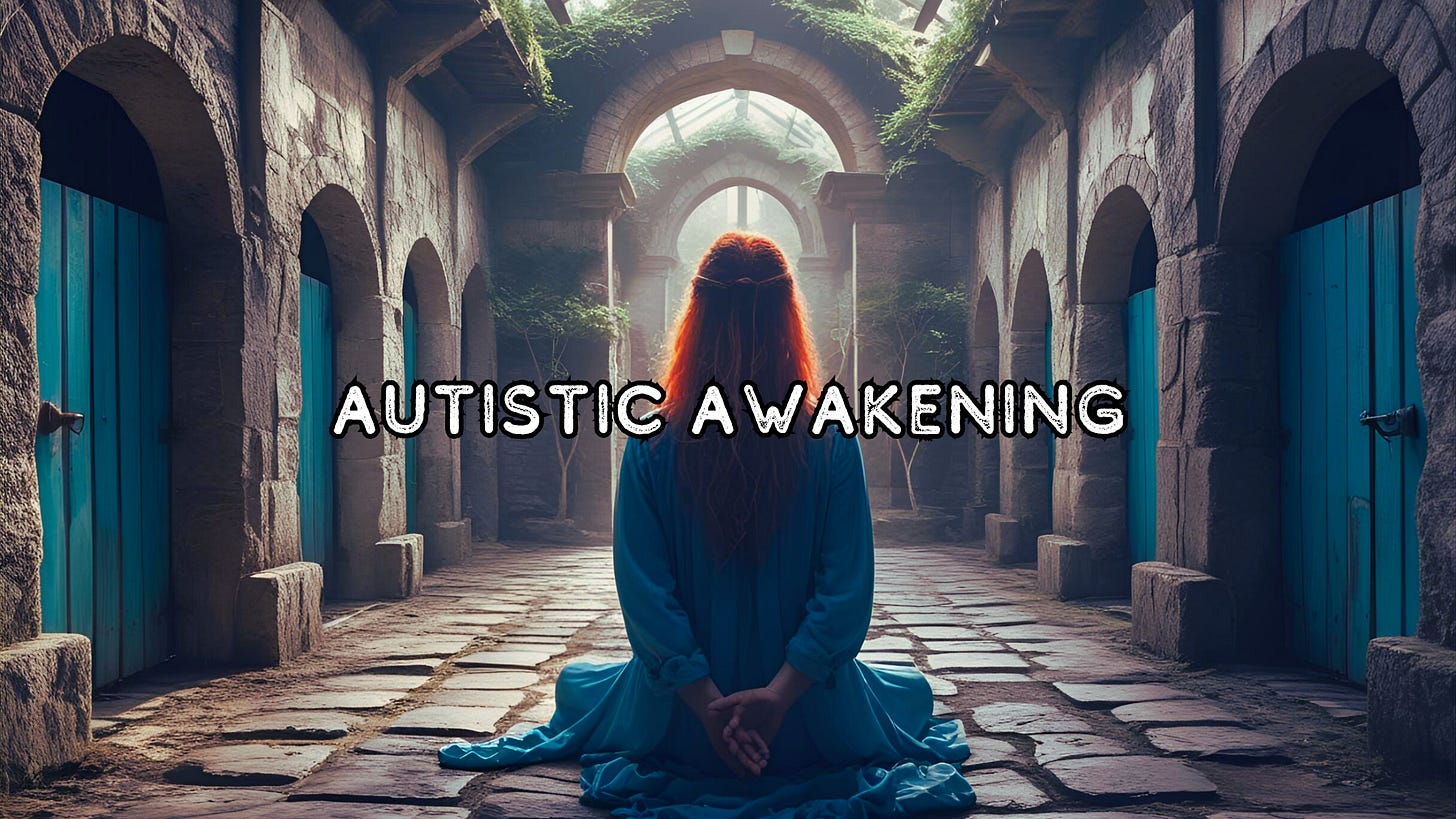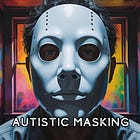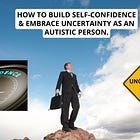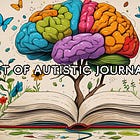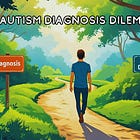Break Free From The Validation Prison & Trust Your Authentic Spirit: My Autistic Awakening
How to break the habit of seeking reassurance and validation from others and trust your autistic instincts and live freely.
The act for reassurance and validation from others is something that all autistic people face, as this need or desire usually stems from the anxiety they have from feeling insecure about their autism and as human beings. To be able to live freely and trust your authentic spirits, autistic people must learn to let this negative behaviour go and replace it with the qualities that’s showing signs of an autistic awakening.
To get a true understanding of the topic of this newsletter, we need to answer this complex and emotive question: why does autistic people seek constant validation and reassurance from others and how can they overcome this intrusive need and be able to trust their own authentic instincts?
One of the many reasons why autistic people need constant validation and reassurance is based around their insecurities and uncertainties growing up as children, the anxieties and fears experienced as they progress into adulthood, and the act of masking or hiding their autistic traits in efforts to fit into a world that’s not build around their needs and expectations and society treats them like shit.
As people in society often show disdain or negative perceptions towards people on the autistic spectrum, the thoughts and feelings associated with this feeding into the adverse views that autistic people can hold about themselves and it acquaints to them developing more behaviours and thinking patterns that supports the adverse and negative mindset and opinions they can hold. All this does, however, is strengthens the behaviours and thoughts that keeps them trapped and feeling lost with themselves.
As an autistic child and getting into early adulthood, there’s been many occasions where my insecurities have clouded the good things about my autism and fixated too much on the bad things I thought about my autism, which only perpetuated the vicious cycle of anxiety and despair further. It’s very easy for autistic people to get caught up in their anxiety and mental health where it can dictate their lives, as they focus on the things outside of their control rather than controlling their responses to situations or scenarios.
I’ve mentioned many times in previous newsletters that anxiety is one of the major cornerstones of the autistic spectrum, it’s important that autistic people have the awareness of how anxiety affects them and establish healthy routines and strategies to manage and overcome their mental states and induce more peace and harmony in life. The newsletter link below highlights how big of an issue anxiety is for autistic people and I share my experiences of how I coped with it and changed things for the better.
Building on from this, the need or act of seeking reassurance and validation from others can also be signs of someone who has OCD (obsessive compulsive disorder), which in itself is an anxiety disorder and that between 17% to 37% of autistic people suffer with OCD at some point in their life (NIH, 2024). OCD can range from something basic like constantly checking the door before leaving your house to something more complex where you constantly question about a certain aspect of your being where you need validation from others to feel better about yourself, which only provides temporary relief and the intrusive voice comes back stronger.
This process can also apply to when you try to mask your autism traits or deny that you’re autistic; it’s the universe’s way to keep pestering you until to come to accept the very thing that you’re running or blocking away from. Trying to force yourself to fit into situations or environments that doesn’t suit you is only causing you real self-harm to your soul and heart without realising it.
There comes a time, a crossroads, when you’ve got to decide on you either carry on denying you’re autistic and trying to fit into social norms that is causing anxiety to strengthen or accept your autism, the good and the bad, and build towards becoming the best version of yourself that’s on your terms.
Growing up as an autistic child, I always thought I wasn’t autistic and tried to be more like my neurotypical peers, in efforts to fit and be accepted by the norms or expectations that society unconsciously puts on everyone; but only resulted in me putting immense pressure on myself to perform to a standard that wasn’t necessary and just hurting myself in many that one could imagine. It’s not just autistic people; there’s many neurotypical people out there that try to live to society’s expectations for a variety of reasons and feeling miserable and living in despair as a result of it.
After many years of coming to terms with my autism and embrace who I am as a person, the constant need for validation or reassurance from others or what is perpetuated online started to diminish and I adopted a more less serious, laid back approach to looking and evaluating things beyond my control and focus more on the things that matter to me and pursue forward with the goals and dreams I’m working hard for.
Autistic people may seek reassurance and validation when in situations and environments that greatly tests their sensory overload difficulties, their lack of understanding for social clues/norms, stressing over negative past experiences as they feel it might happen again, and dealing with outside influences that’s having a massive impact on their health and wellbeing. These can happen at any age or stage in life and can have a detrimental effect on an autistic person’s overall wellbeing, if it’s allowed to fester and isn’t challenged early on before it takes hold of one’s ability to live their life independently and with intention.
There’s been many occasions, to the point where I’ve lost count, of when my sensory overload has gone into overdrive or experienced uncomfortable situations of where my lack of understanding social clues/norms has made me seek out reassurance or validation from others in the presence of having high anxiety or distress. This is mainly when a person isn’t trained or got the confidence to manage these situations effectively on their own and often require the support of another person to help them calm down. Which is why it’s important to overcome the anxiety or OCD behaviours that’s keeping them trapped in the vicious cycle is vital to feel free and be more confident within themselves.
There’s some of my suggestions that’ll help you to break free of the prison of validation and push yourself towards the signs of an autistic awakening.
Recognise your compulsive habit for seeking validation and consider using CBT to combat your anxious behaviours
To be able to confront your fears or habits that’s holding you back in life is first to have the self-awareness for these behaviours and the associated thoughts and feelings you experience at the same time. You’ll be surprised by how many people in the world, autistic and non-autistic, don’t have the self-awareness or want to accept that we’ve got habits and behaviours that are disruptive to their lives and is only perpetuating their vicious anxiety cycle further. So, when you’re constantly seeking validation and reassurance from others to feel better about yourself or your approach to situations, you’re really feeding into OCD tenancies, which in itself are anxiety-driven behaviours and derails your courage in the face of managing and embracing uncertainty.
I know it sounds scary than it looks, but the one thing I’ve learnt over the years as an autistic person is that uncertainty is part of everyday life and can’t be avoided; any efforts to do so will only result in more anxiety and despair. To overcome my anxiety and reduce the need of seeking validation and the anxiety associated with it was CBT (cognitive behavioural therapy). CBT is a talking therapy where autistic people can talk through their anxious thoughts and worries with a mental health practitioner, so to challenge and change the meaning of the thoughts and their associated anxiety behaviours to improve their mental state and develop coping strategies to solving their current issues. Along with consistent practice and dedication, autistic people can learn to desensitise their feelings to the thoughts and worries one has about external validation and come to terms with their autism and embrace who they are as unique individuals with a lot to give to the world.
Consider using a journal to record and reflect on your thought patterns and to provide positive affirmations about yourself
Another great method to help you overcome your need for external validation from others and the anxiety behaviours associated with it is keeping a journal, which you can use to record the amount of times you need calls of validation and reassurance and reflect on how you responded to situations, as well as detailing what anxiety feelings you felt at the time. Along with using cognitive behavioural therapy, journaling can help you keep grounded in your efforts to overcome the anxiety-driven nature of the habit of seeking validation from others and build more positive affirmations about yourself and increasing your self-confidence as an autistic person.
When I was really struggling with my anxiety about a wide range of issues along with the need for seeking external validation from others, I wrote into a journal about my thoughts and feelings associated with my anxieties, as well as learning and using CBT. By doing this on a consistent basis and taking proactive to get my mental health better, the need to seek validation about my autism and intrusive thoughts I suffered with started to diminish over time and got myself to a place where I’m now that’s more laid back and less serious approach about things. I still get anxiety every now and then, as it’s a cornerstone of the autistic spectrum, but be more capable to combat it better and live my life on my terms.
Reconnect with your special interests or develop new ones as a source of joy and life choices
To be able to cope with the anxieties that are related to the you need of seeking external validation and reassurance, it’s very useful to be connected to your special interests, current and new, as they can provide a source of enjoyment, a way of focusing your mind when experiencing high anxiety, and to identify purpose and passion for future employment or starting a business. Special interests can change or evolve as autistic people get older and develop more life experiences, whilst there can be special interests that can stay with people all lifelong.
Being in touch with my special interests helped me massively with moments of high anxiety and feeling insecure with myself; as they offer an escape and a focus on the positives of my life rather than fixating on the negatives that were driven by my anxiety and the symptoms experienced. Many interests of mine can range from watching Top Gear (2002 to 2015) with Jeremy Clarkson, James May and Richard Hammond, to developing my love for the James Bond 007 film franchise, and being an amateur connoisseur passionate about the history of scotch whisky.
Cultivate a unique path forward for yourself that leads to a symphony of your own autistic awakening
Even when you do overcome your need to seek external validation and reassurance, you need to have something that’s positive and uplifting to fit in its place; something that propels you forward to a life filled with your goals and dreams. It’s a little thing called an autistic awakening. An autistic awakening is described as the point where an autistic person gets to a place of self-acceptance and confidence, whilst unleashing themselves away from the layers of societal conditioning, reconnecting with their true autistic natures, and live for their purposes and passions on their terms and visions.
There are many signs of an autistic awakening that you can experience, ranging from:
You feel less urgency to check for other people’s approval and validation of you before acting out.
You spend more time in states of calm and focus rather than lashing out on anxious impulse.
You find pride in your sensory preferences, communication styles, and special interests and passions.
You start saying ‘no’ to things and people that don’t bring many purposes to your life without needing to justify it.
You seek and create environments where your natural autistic traits thrive, rather than forcing yourself into environments where you must falsely perform.
When the days came that I felt freer than ever before from the anxieties that kept me hiding my true self and constantly questioning myself or seeking reassurance from others, my body and mind rejoiced and it was the moment that I started planning and working towards my goals and dreams in life. This eventful moment where a weight was lifted from my shoulders only came within the last few years; so my story is a testament to other autistics that the pains you currently suffer with are only temporary and things in life can change for the better.
Conclusion:
Many autistic individuals struggle with a deep-rooted need for external validation, a habit often shaped by early experiences of insecurity, societal misunderstanding, and the exhausting effort of masking autistic traits to fit in. This constant pursuit of reassurance creates cycles of anxiety and self-doubt, leaving autistic people feeling trapped and disconnected from their true selves. Over time, an important realisation emerges: freedom and self-acceptance are found not in the approval of others, but in learning to trust one’s authentic instincts; a shift often described as the beginning of an autistic awakening.
Through personal reflection, I share how years of chasing validation led to internal pressure and anxiety, and how embracing my autistic identity allowed me to break the cycle. I emphasise that overcoming the need for constant reassurance begins with self-awareness and proactive strategies, such as cognitive behavioural therapy (CBT), mindfulness, and journaling. These practices not only help identify and reframe intrusive thoughts but also build resilience and confidence. By reconnecting with special interests and focusing on passions, autistic individuals can shift their energy from external validation toward pursuits that bring them joy and meaning.
An autistic awakening unfolds as one learns to live intentionally, honouring their natural traits and boundaries. Signs of this transformation include a reduced urgency for approval, a calmer and more focused mindset, and the courage to seek environments that nurtures rather than suppresses their uniqueness. My journey serves as a testament that self-acceptance takes time, but with intentional effort, it leads to a life of authenticity, purpose, and inner peace, where autistic people can thrive unapologetically and cultivate their own paths forward.
Sources:
Autism (NIH, 2024) ‘‘Autism is the Arena and OCD is the Lion’: Autistic adults’ experiences of co-occurring obsessive-compulsive disorder and repetitive restricted behaviours and interests” https://pmc.ncbi.nlm.nih.gov/articles/PMC11497754/


